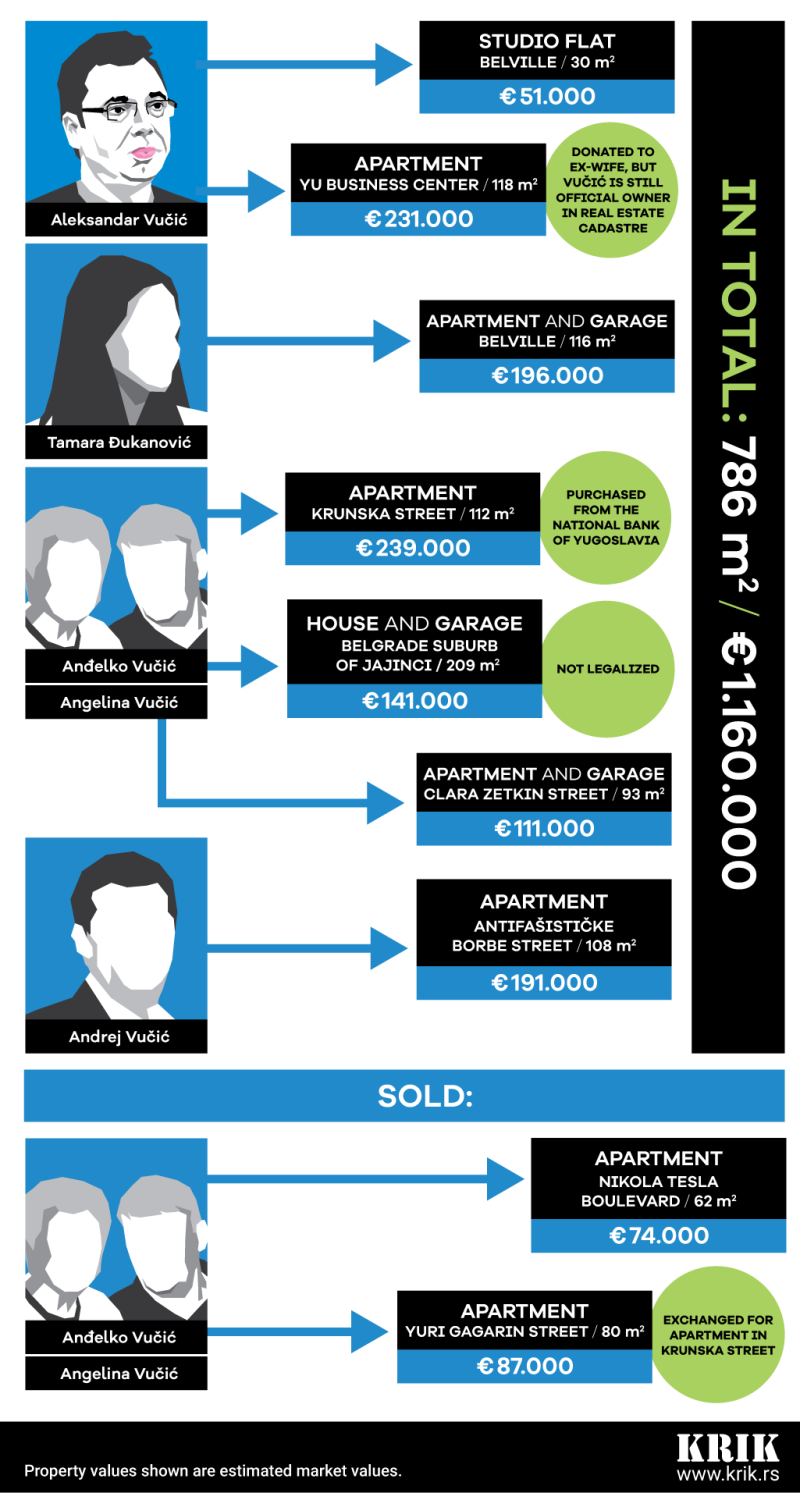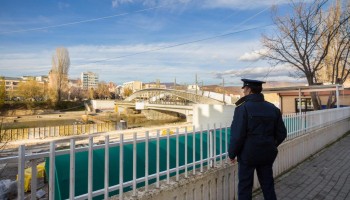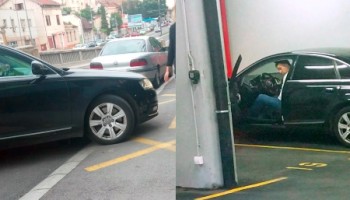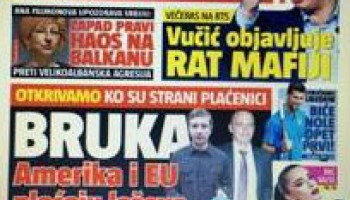Two of the apartments were purchased from the state in the 1990s, apparently at bargain prices.
And yet Vučić’s property declaration, published on Serbia’s Anti-corruption Agency web page, indicates he’s one of the poorest statesmen in the region.
He reports owning just one 30-square-meter studio flat, and no other property – no cars, no companies, no savings in the bank. His monthly wage is around € 1,000, so even buying the studio flat must have been a stretch for him.
Vučić's family, however, holds a large number of assets in Belgrade. They are mostly big apartments in expensive locations, according to an investigation by OCCRP/KRIK reporters.
The prime minister's wife owns an apartment of more than 100 square meters, adjacent to his studio flat in the Belville residential complex. She bought it from a businessman the opposition claims is close to the government.
It is not clear who owns an apartment of 118 square meters, located in the upscale YUBC commercial and residential resort, which Vučić bought from the state in the 1990s. Although Vučić gave it to his ex-wife, who lives there today, the contract was never delivered to the Real Estate Cadastre, so Vučić is still the official owner.
Vučić’s brother, meanwhile, owns a flat of 108 square meters in New Belgrade, the part of the Serbian capital that was built after the 1960s.
His parents own a family home of 200 square meters in Belgrade's suburb of Jajinci; an apartment of 112 square meters in Belgrade city center; and an 80-square-meter flat in New Belgrade. Vučić’s mother had one more flat, but she sold it for about € 75,000 during the OCCRP/KRIK investigation.
The family’s most valuable apartment, at an estimated value of € 239,000 (US$ 272,000), is located in Krunska Street in the city center. Vučić’s father got it at the end of the 1990s in an apartment exchange with the National Bank of Yugoslavia. Experts say the bank lost money on the deal.
The total value of the Vučić properties, not counting the recently sold apartment, is around €1,160,000. It is difficult to determine where the money to buy all of this came from.
Since 2012, Vučić’s monthly wage has been around € 1,000, while his wife’s monthly salary at the Ministry of Foreign Affairs is around € 550. His parents Anđelko and Angelina are retired, and according to Vučić's statements they have monthly pensions of € 650 and € 730. The salary of Vučić’s brother Andrej, who works at the National bank of Serbia, is unknown.
OCCRP/KRIK researched this story as part of the investigation project “Serbian officials’ property,” which is partly financed by readers. OCCRP and KRIK believe that citizens have the right to know about property of officials and their families. Because of this investigation, the pro-governmental tabloid “Informer” launched a smear campaign against KRIK journalists.
Vučić told OCCRP/KRIK that he never had money and that his parents helped him to buy the studio flat in Belville and the apartment his ex-wife now lives in.
He said that he doesn't have anything to do with his wife's apartment, or with assets that belong to his parents and brother.
“You counted apples and oranges. You can't find anything on me so you counted the assets of my father and my mother,” Vučić said.
“Do you know what is the problem with everybody who thinks that they will find something on me? There is nothing to find. I never stole anything,” said Vučić. “I don't wear expensive clothes. I'm just interested in what I can do for my country and for my people.”
Vučić said he overpaid for the apartment that he got from the state in the 1990's, and said that his father did not get a sweet deal when he bought the apartment in Krunska street.
Belville and Win-Win
Vučić bought his studio flat in April of 2014, according to the sales contract reviewed by OCCRP/KRIK. The flat is located in the New Belgrade business and residential resort Belville, which was built by Miroslav Mišković's company. The apartment is now worth an estimated € 51,000. Vučić paid € 39, 000 for it, according to the contract.
Based on his reported bank savings and current salary, it’s hard to see how he could afford it.
Vučić told OCCRP/KRIK that his parents helped him buy it.
“Father bought me that studio flat,” he said. “My parents sold an apartment, and my mother even sold a house in Bečej (a city in northern Serbia), everything that she inherited from her parents, so I could buy that studio. I paid just a minor part.”
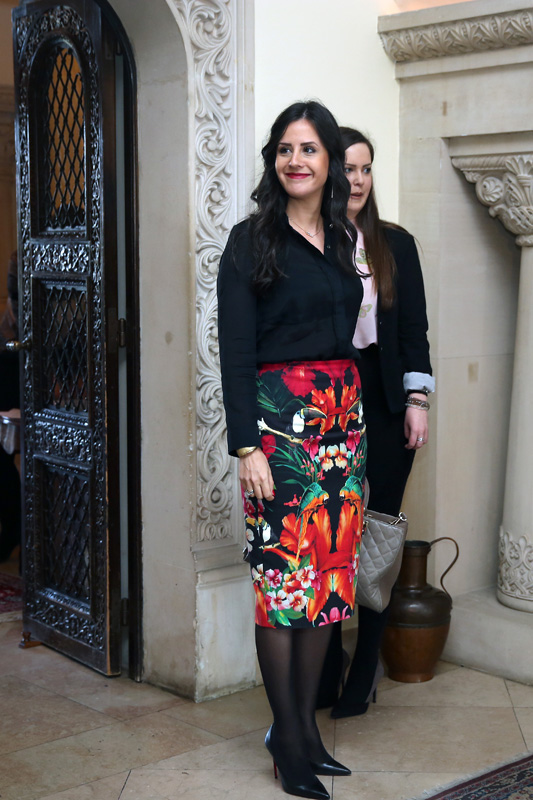 Tamara Đukanović (foto: Kurir) Next to the studio is a larger apartment (104 square meters) owned by his wife, Tamara Đukanović. She also owns a large garage (12 square meters) in Belville. Together, her apartment and garage are worth about € 196,000.
Tamara Đukanović (foto: Kurir) Next to the studio is a larger apartment (104 square meters) owned by his wife, Tamara Đukanović. She also owns a large garage (12 square meters) in Belville. Together, her apartment and garage are worth about € 196,000.
Đukanović has worked for the Ministry of Foreign Affairs since August of 2010 as a counselor in the European department, earning about € 550 per month. She bought the apartment in May of 2013 for € 135,000, according to the sales contract.
The seller was Slobodan Kvrgić, the owner of the Win-Win company which sells computers and related goods. Opposition parties say he is a businessman close to Vučić. His businesses started to grow when Vučić’s Serbian Progressive Party came to power, according to data from the Serbian Business Register Agency. The income of Kvrigć's main company has skyrocketed from € 100,000 in 2010 to € 14,500,000 in 2014, primarily due to public tenders.
Vučić told OCCRP/KRIK that his studio and his wife's apartment are two entirely separate assets.
“It has nothing to do with [our] marriage status,” Vučić said. “It was bought separately. Her parents bought that apartment [a long time] before and they have both a loan agreement and a credit agreement.”
Vučić’s explanation appears to directly contradict the evidence of the sales contract showing the transaction between Kvrigić and his wife, although he offered no documents to support his version of events. He said he doesn't know Kvrigić and that Kvrgić is not close to his government.
“I don't know who that is. This is the first time I've heard of him,” Vučić said. “I never saw the man.”
Kvrgić didn't respond to OCCRP/KRIK questions sent by e-mail.
Flats bought from the state
The Vučić family bought two apartments from the state while Vučić was Minister of Information in Slobodan Milošević’s government from 1998-2000. Those apartments were bought at low prices, although Vučić says he can’t remember exactly what they were. He says his position at the time had no impact on the purchases.
In December of 1998, Vučić bought from the state a 118-square-meter apartment in the building known as Little Red Riding Hood in the YUBC resort. Today the apartment is worth € 231,000.
It is not clear what he paid for it, as the Real Estate Cadastre, in violation of the law, refused to provide documents about this apartment to OCCRP/KIRK journalists.
Vučić said that he doesn't remember how much it cost, but says he overpaid, because he had to pay extra tax after the revolution in 2000.
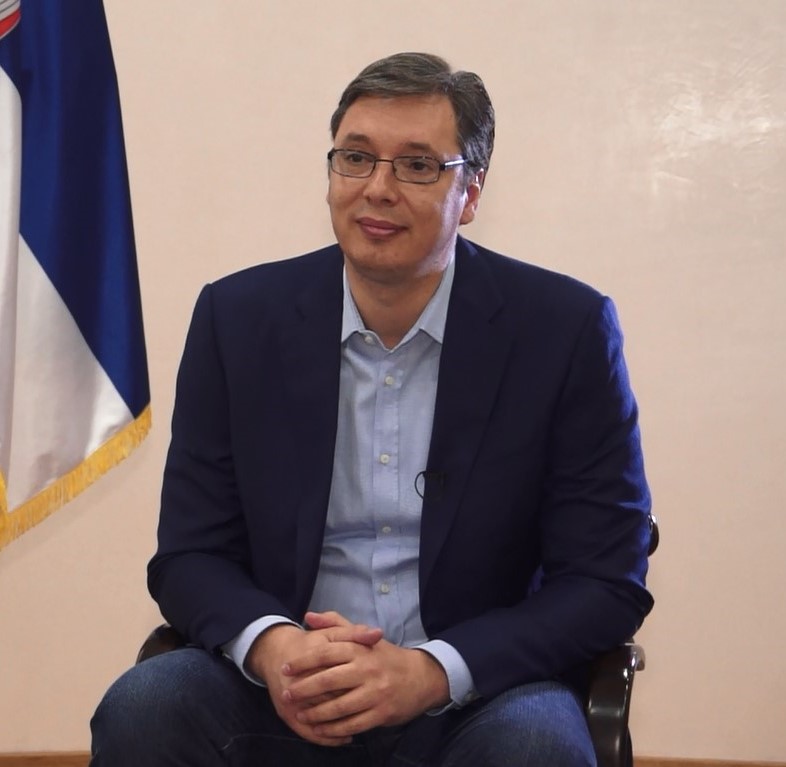 Aleksandar Vučić (foto: KRIK) “I don't know (how much I paid). I was not prepared to justify myself to you. After 2000, they asked for extra tax and I've paid that. I've paid so much they were very happy, because they managed to punish me,” Vučić said.
Aleksandar Vučić (foto: KRIK) “I don't know (how much I paid). I was not prepared to justify myself to you. After 2000, they asked for extra tax and I've paid that. I've paid so much they were very happy, because they managed to punish me,” Vučić said.
Vučić said that his family helped him to pay for the apartment, along with Vojislav Šešelj, leader of the Serbian Radical Party.
“I was not the one who paid, it was mostly my father. That's because I had no money, as I don't have it today,” Vučić said. “To be thankful and fair, I think that also Šešelj helped and gave something (some money).”
Šešelj told OCCRP/KRIK that he can’t remember if he helped financially, but he did sign a request for Vučić to get the apartment. “He didn't want to sign, even though he had a wife and child and they lived in 28 square meters.” Šešelj says Vučić was “too modest” to make the request himself.
On Dec. 9, 2013, Vučić signed over the apartment to his ex-wife. This contract, however, was never delivered to the Real Estate Cadastre so, according to its records, Vučić is still the owner. Vučić said that making sure the change was filed was not his responsibility.
The Vučić family bought one other apartment from the state at a low price, OCCRP/KRIK discovered.
Swap with the bank
The value of apartments
OCCRP/KRIK journalists hired a real-estate agency to calculate the value of the apartments. A detailed calculation was done for each of them. The market value of apartments doesn't necessarily correspond to the contract value. The agency involved didn't want to be named in the story.
The apartment in Jurija’s Gagarina Street was not counted although Vučić's father is still its official owner according to the data from the Real Estate Cadastre. During the KRIK investigation, the Vučić family sold one apartment in Nikola Tesla Boulevard, so that one wasn’t counted either.
Vučić’s parents, Andjelko and Angelina, own a large apartment in Krunska street in Belgrade’s city center. This apartment, which measures 112 square meters, is the most valuable the family owns.
Documents show that the apartment was purchased from the National Bank of Yugoslavia in 1998 in a very good deal for the family. Andjelko Vučić was working for the National Bank at the time.
The apartment had been owned by businessman Zlatan Peručić, director of Beobanka bank, who bought it in 1992. Peručić sold the apartment to a company called MM Inženjernig in March of 1998. This company sold it again to the National Bank of Yugoslavia, which paid 2.3 million dinars (380,000 German marks at that time).
Seven days later, the National Bank validated a contract with Anđelko Vučić for an exchange of apartments. This contract was prepared 10 days before the bank bought the apartment from MM Inženjering, according to the contract seen by KIRK reporters.
Vučić's parents exchanged the 89-square-meter apartment in New Belgrade for this larger (112 square meters) apartment in the city center. Based on current market values, the apartment which they got from the National Bank is worth about € 240,000, or three times as much as the apartment they gave in exchange.
It's not clear why the National Bank agreed to the deal. Experts who talked to OCCRP/KRIK said the exchange was not a good deal for the bank and appears to violate regulations.
Vučić claims that the apartment was exchanged with the bank in 1997, when he wasn't a minister. However, contracts that OCCRP/KRIK got from the Real Estate Cadastre were signed in the summer of 1998, several months after Vučić was named minister.
“What do I have to do with that? We were not in power back in 1997, when my father exchanged the apartment. I have a contract which shows that happened in 1997,” Vučić said. “My father exchanged an apartment at New Belgrade where they lived for 21 years and he paid in addition. Without me in power, without anything. I didn't even know they were moving to the city center.”
Other real estate
Vučić’s parents own several other properties in Belgrade.
His father owns an 80-square-meter apartment in New Belgrade, in Klara Cetkin Street. The market price of this property and a garage is € 111,000.
Until recently his mother owned a 62-square-meter apartment in the Boulevard Nikola Tesla in New Belgrade, with a market value of € 74,000. She sold it in early 2016.
The biggest real asset that the family owns is the house in the Belgrade suburb of Jajinci.
This is the house to which Vučić brings important guests from abroad, including foreign officials.
The house was built without a construction permit and has not been legalized, although the Department of Legalization confirmed to KRIK/OCCRP that Vučić’s family has asked for this issue to be resolved. The whole suburb was built illegally, without permits.
According to a surveyor’s document, the house is owned by Andjelko Vučić. The house is 174 square meters and it has a garage of 35 square meters. The market value is around € 141,000.
"This is the smallest house in the neighborhood. Father took the lot in '92, '93 and began to build. It is not legalized because it was not possible to legalize anything at that place," Vučić said. "(Father) has submitted request to legalize it for the fifth time, I hope this time successfully."
Cash and loan
Andrej Vučić, the prime minister’s brother, owns a four-bedroom flat of 108 square meters. The apartment is located in New Belgrade and is worth about € 191,000.
Andrej Vučić works at the National Bank of Serbia, but his earnings are unknown as the bank would not provide this information to KRIK/OCCRP. In its written reply the institution just stated that Andrej Vučić has worked at the National Bank for more than 18 years and that he graduated from the Faculty of Economics in Belgrade.
Until he bought the apartment, his registered address was Krunska Street, where his parents still live.
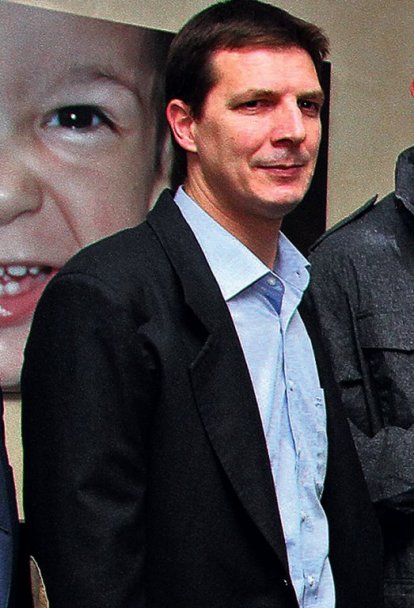 Andrej Vučić (foto: Kurir) Andrej Vučić and his then-wife bought the apartment in April 2008 for € 200,000. They transferred € 100,000 from their bank account, and the rest was financed from bank loans, according to the contract. The flat carries a mortgage of 156,000 Swiss francs (US$ 160,000).
Andrej Vučić (foto: Kurir) Andrej Vučić and his then-wife bought the apartment in April 2008 for € 200,000. They transferred € 100,000 from their bank account, and the rest was financed from bank loans, according to the contract. The flat carries a mortgage of 156,000 Swiss francs (US$ 160,000).
Four years later, Andrej Vučić divorced and bought out his former wife. According to the contract signed in September 2012, he paid her € 40,000 (US$ 45,500).
Andrej Vučić didn't want to talk to KRIK/OCCRP reporters. He only said that he is not a public figure and therefore he doesn't want to appear in public.
The prime minister said it was unfair to question his relatives about their private business. “What bothers you is that my brother has an apartment,” said Vučić. “You summed up my brother's properties. You are investigating my dad, 75 years old, and my mom, 72 years old, and I find it interesting that you do that since nobody ever did it before and it has nothing to do with any kind of authority.”
“I have to tell you, there's something else you have not [included],” said Vučić. "I have something even more valuable. You should come with me to Bugojno [in Bosnia], where we have houses that we haven’t sold. Now my father is selling another apartment, probably the one in Clara Cetkin Street, to let you know He is selling it so he can build a house in Bugojno.”
Pressures during the investigation
While working on this story, OCCRP/KRIK journalists were exposed to pressure and sabotage. Some state institutions violated the Law on Free Access to Information of Public Importance and refused to provide data on the assets of the Vučić family.
The Republic Fund for Pension and Disability Insurance refused to provide information about Vučić’s years of service. The Commissioner for Information of Public Importance and Personal Data Protection has ordered the institution to provide the information to OCCRP/KRIK.
The Republic Geodetic Authority refused to provide documents relating to the change of ownership of real estate owned by the Vučić family. The Director of Cadastral Municipality Novi Beograd told KRIK journalists that the request was not answered because they are waiting for “instructions on how to proceed.”
Privacy
Journalists collected only official information about the property. They did not interfere with privacy and in order to protect it, journalists have published only names of the streets where apartments are located, but not the exact addresses. The property of top officials is a legitimate topic worldwide.
During the investigation, journalists were monitored and recorded on mobile phones by different unknown persons.
At the same time a smear campaign began against KRIK and its editor.
Dragan Vučićević, editor of the pro-government tabloid Informer, falsely accused and attacked KRIK and its editor Stevan Dojčinović on the TV station Pink and then continued the attack in his newspapers for five days in a row.
Dojčinović and KRIK were feataured 10 times on the Informer’s front page. Dojčinović has been accused of being “a fake journalist,” “a Western spy,” “a Mafia associate,” “a sado-masochist” and “terrorist.” Informer also wrote about internal details of a KRIK investigation, describing its progress, and revealed the working title of an unpublished story. The tabloid also published details of private correspondence and conversations between Dojčinović and colleagues from other media.
KRIK believes that those data were collected by surveillance of KRIK, most probably conducted by the intelligence agency, BIA.
Most important members of the leading Serbian Progressive Party supported Informer, saying that the smear campaign against KRIK is simply freedom of the media.
“Informer is not my newspaper,” Vučić told KRIK. “It is a private newspaper, but do not label it as mine because you do not like what it publishes.”
“I am convinced that no one follows you as a journalist. That would be very bad for our country. Nor do I consider you a public enemy. I wish you successful work. I believe I can answer every question, even if you have only unpleasant ones. Unlike others, I did not run away,” said Vučić.
